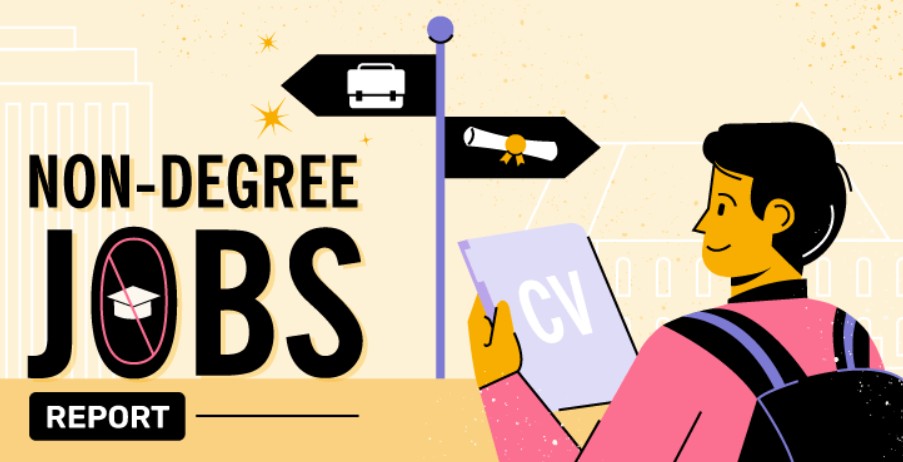Has the UK’s Workforce Outgrown the Degree Model?
Once upon a time, going to university was viewed as the surest way to secure a high-paying, long-term career. But fast forward to 2025, and that traditional model is being disrupted. As student debt continues to climb and the job market evolves, many young professionals and career changers in the UK are asking:
Is a university degree worth the cost, time, and uncertainty?
In a growing number of cases, the answer is a confident no.
Why Are Non-Degree Jobs Paying So Much in 2025?

Let’s take a quick look at why demand and wages are rising for skilled roles that don’t require a degree:
- Digital Transformation: Emerging tech fields like cybersecurity and digital marketing value skills over academic background.
- Skills Gap: Critical sectors such as transport, construction, and logistics face severe talent shortages.
- Cost of Education: With student debt now exceeding £45,000 for many, UK residents are opting for faster, less costly career entry points.
- Apprenticeship Boom: Government-backed apprenticeships and training programmes are opening new doors to lucrative roles.
In this context, jobs that pay over £50,000 annually without a degree are not just real—they’re increasing in both number and value.
What Are the Top Jobs that Pay £50K a year Without a Degree UK?
Explore high-paying roles in the UK where you can earn £50,000+ annually — no degree required. Here’s a list of careers with clear entry paths and concise details:
Train Driver
-
Average Salary: £57,000
-
Requirements: Pass psychometric and medical tests; employer training provided
-
How to Apply: Check career pages of train companies like Avanti West Coast, GWR, and LNER
-
Time to Qualify: 9–12 months
Overview: Train drivers are responsible for safely operating trains. Training is provided by the employer after passing required tests, with full qualification taking under a year.
Air Traffic Controller
-
Average Salary: £51,929
-
Requirements: Complete NATS training
-
How to Apply: Apply via NATS careers portal
-
Training Duration: Up to 12 months
Overview: Air traffic controllers manage aircraft movements within specified airspace, ensuring safety and smooth operations. While no degree is necessary, intensive training and assessments are required.
Ethical Hacker (Cybersecurity)
-
Average Salary: £63,172
-
Requirements: Cybersecurity certifications (e.g., CEH, CompTIA)
-
How to Start: Take online courses or bootcamps (e.g., CompTIA, The Knowledge Academy)
-
Path: Pursue self-learning or begin with foundational IT positions.
Overview: Ethical hackers identify vulnerabilities in systems to protect against cyberattacks. Certifications are key to entering the field, with plenty of online resources available.
Rope Access Technician

-
Average Salary: £62,400
-
Requirements: IRATA Level 1 certification
-
How to Get Started: Attend a 5-day IRATA training course
-
Next Step: Gain hours for higher certification levels
Overview: Rope access specialists operate in hazardous settings such as offshore platforms or high-rise structures. It requires physical fitness and safety certifications.
Digital Marketing Manager
-
Average Salary: £50,000+
-
Requirements: Google, HubSpot, or SEO certifications
-
How to Begin: Enrol in online courses (e.g. Google Garage, HubSpot Academy)
-
Career Path: Start as an executive or freelancer and progress
Overview: Digital marketing managers strategise and execute online campaigns. A degree isn’t needed, but certifications in tools like SEO and Google Ads are crucial for success.
Private Commercial Pilot
-
Average Salary: £60,796
-
Requirements: CAA Commercial Pilot Licence (CPL)
-
How to Apply: Enrol in an accredited flight school
-
Training Cost: £60,000–£100,000
Overview: Private pilots fly small aircraft for clients or businesses. This role requires specific flight training and a commercial pilot licence, which can be costly but highly rewarding.
Construction Site Manager
-
Average Salary: £53,972
-
Requirements: NVQ Level 6 or similar
-
How to Start: Start in construction and complete NVQ via on-site training
-
Path: Advance from site worker to manager
Overview: Site managers supervise projects, ensuring safety and compliance. Starting as a labourer or foreman can lead to this managerial role with the right qualifications.
Luxury Estate Agent
-
Earnings Range: £50,000–£70,000+
-
Requirements: Sales skills and property knowledge
-
How to Enter: Apply to firms like Savills or Foxtons; experience is more important than formal education
-
Tip: Understanding luxury property markets is an asset
Overview: Estate agents handle property sales, with luxury agents earning high commissions. Strong sales skills and a good understanding of high-end properties are essential.
Food Safety Inspector
-
Average Salary: £60,522
-
Requirements: FSA training or local council certification
-
How to Apply: Look for job openings in local councils or food agencies
-
Duration: A few months of training
Overview: Food safety inspectors ensure food businesses comply with health standards. Training is provided by the Food Standards Agency or local councils.
HGV (Heavy Goods Vehicle) Driver – New Addition
-
Average Salary: £52,000+
-
Requirements: Acquire an HGV Category C or C+E license and complete the required Driver CPC training
-
How to Get Started: Enrol in a training provider to get licensed
-
Application Route: Apply to logistics firms like DHL or Amazon
Overview: HGV drivers transport goods across the UK. You’ll need to complete specialised driver training, and there’s currently a high demand for drivers, offering opportunities for better pay and bonuses.
How Can You Enter These Professions Without a Degree?
Are There Official Entry Routes?
Yes—and many are funded or subsidised by employers or the government. Here’s how you can get started in some of these high-paying professions:
Air Traffic Controller
- Entry through the NATS College programme
- Earn while you learn with an 18-month training program—no college degree needed.
- Must pass a rigorous selection process, including simulation tests
Train Driver
- Apply through Network Rail or train operating companies
- Must pass medical, safety, and psychometric assessments
- Training includes classroom learning and shadow driving
Ethical Hacker

- Self-paced learning through online platforms and cyber boot camps
- Common certifications are CEH and CompTIA Security+.
- Entry-level IT or helpdesk roles can be a starting point
Rope Access Technician
- IRATA Level 1 training lasts 4–5 days and costs about £1,000.
- Rapid progression to Level 2/3 boosts earnings
- Often works in industrial, offshore, and repair sectors
What’s Driving the Growth in These Roles?
1. Infrastructure and Transport Expansion
With HS2, Northern Powerhouse Rail, and other infrastructure projects in motion, construction managers, crane operators, and train drivers are in high demand.
2. UK’s Cybersecurity Push
In light of increasing global cyber threats, the UK government is doubling funding for digital resilience, leading to a boom in cybersecurity and ethical hacking jobs.
3. Post-Brexit Skills Gaps
Following Brexit, industries that once relied heavily on EU workers, such as food inspection, logistics, and agriculture, are now desperate for trained UK talent.
What Skills Matter Most in These Roles?
Even though these jobs don’t need a degree, they do require:
- Excellent communication and relationship-building abilities (real estate professionals, marketing)
- Attention to detail and precision (air traffic control, pilot)
- Technical certifications or licenses (ethical hacking, rope access)
- Leadership and safety awareness (construction, food safety)
Valuable Certifications (No University Required)
| Certification | Relevant Jobs | Time to Complete |
|---|---|---|
| CompTIA Security+ | Ethical Hacker | 3–6 months |
| NVQ Level 3-6 | Construction Manager | Varies |
| IRATA Rope Access Level 1 | Rope Access Technician | 1 week |
| Google Digital Garage | Digital Marketing | 1–2 months |
| FSA CPD Training | Food Inspector | 2–6 months |
Who Are These Jobs For?
School Leavers
- Many apprenticeships now lead directly into £50K+ roles within 3–5 years
- Lower cost, more practical, and immediate experience
Mid-Life Career Switchers
- Former hospitality, tourism, and retail workers are shifting to digital or trade skills.
- Fast-track training is available and often supported by local councils
Parents and Part-Timers
- Some roles (digital marketing, estate agency, private chauffeur) offer flexible hours and remote options
Final Thoughts: Is a Degree-Free £50K Job the New Normal?
The idea that only graduates can earn top salaries in the UK is not just outdated—it’s being disproven daily across industries.
From railway cabins to rooftops, from cyberspace to private boardrooms, countless paths to success don’t go through a university campus. The key is to identify your strengths, explore vocational and technical opportunities, and embrace a skill-first mindset.
For thousands of Britons in 2025, the road to a rewarding, respected, and high-paying career doesn’t start with a UCAS application—it starts with action, training, and ambition.
FAQs: What People Are Asking About £50K Jobs Without Degrees?
Can someone truly earn £50,000 without having spent years building experience?
Yes, especially in fields like train driving or rope access. These often start around £30K and rise rapidly within 2–3 years.
Can I make this transition without quitting my current job?
For many digital-focused or certification-based paths (ethical hacking, marketing), evening or online courses make this possible.
Are these roles safe from automation?
Roles requiring human judgement, such as air traffic control, construction management, and client-facing services, are among the least likely to be automated by 2040.
Do I need GCSEs or A-Levels for any of these?
Generally, a few GCSEs (particularly English and Maths) are beneficial, but many employers focus more on aptitude tests and certification achievements.

Leave a Reply